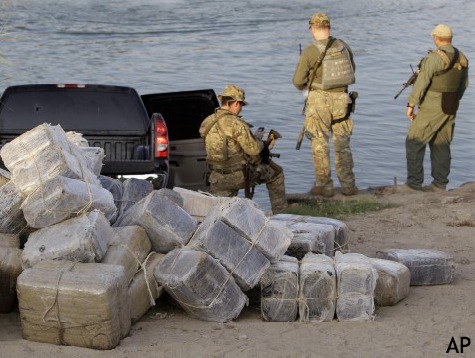
The gas and oil boom has allowed Texas to prosper, but Mexican drug smugglers may also be benefitting from the healthy industry.
A significant amount of gas and oil business is conducted on large, private ranches near the Texas-Mexican border. As the industry has exploded, traffic on historically-remote roads that pass through such ranches has increased significantly.
The National Journal’s Ben Geman reported, “Just five years ago, perhaps a dozen vehicles per day would be traveling on the even smaller, private roads that cut directly through the big ranches here, according to the federal Border Patrol. Today, thanks to surging oil and gas production in this Eagle Ford Shale region, they can number in the hundreds.”
This increased traffic may allow drug smugglers from Mexico to easily blend in and transport narcotics undetected.
“Essentially what’s happening is you’ve got smugglers who are stashing marijuana, or other drugs, in trucks that are either ‘cloned’ to look like one of the industry trucks, or some type of truck that seems to fit right in driving around on these ranch lands,” Geman reportedly told the Texas Standard.
Border Patrol spokesman Daniel Tirado of the Rio Grande Sector told Breitbart Texas that most of the larger drug seizures in his area are made from commercial vehicles.
But Tirado pointed out, “Just because they’re commercial doesn’t mean that they’re transporting narcotics.” He said officers rely heavily on canines to detect the odor of drugs.
Still, as some drug smugglers have perfected the art of “cloning” industry trucks, it is hard for officers to pinpoint and pull over suspicious vehicles.
In response to this challenge, thousands of individuals in the gas and oil industry have allegedly teamed up with law enforcement to create Integrated Frontline Resources Awareness Campaign (iFRAC). iFRAC is a joint initiative to identify and cease drug trafficking, specifically in the Eagle Ford Shale region.
Border Patrol spokesman Ricardo Aguirre told the National Journal, “We have increased traffic here and there’s increased people traversing through here and trying to get through. But by the same token we also have an increased number of eyes out there to report any illicit activities.”
iFRAC has apparently lead to the confiscation of more than 9 tons of marijuana, mostly in areas near gas and oil activity.
At this point, it is unclear if iFRAC will lead to a significant decrease in Texas-based drug trafficking. 9 tons is a small portion of the total amount of marijuana regularly confiscated in the state–an average of 13,000 pounds are seized in the Rio Grande Valley area alone each week.
Breitbart Texas’ managing director, Brandon Darby, previously spoke on oil booms in Texas and the magnet such industries can be to Mexican cartel activity. While speaking on West Texas’s KFYO about the similarities between the oil boom and Texas and the boom in South Dakota, he stated, “If people in Texas don’t think that affects them…we’re having an oil boom, so what happens when you have that kind of boom? You have girls, sex trade, and methamphetamine–so who moves in? Cartels move in, just like they have in other regions of the country.
Follow Kristin Tate on Twitter @KristinBTate.

COMMENTS
Please let us know if you're having issues with commenting.